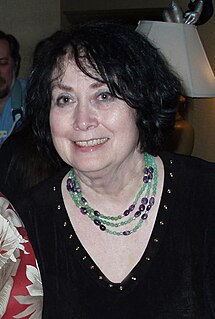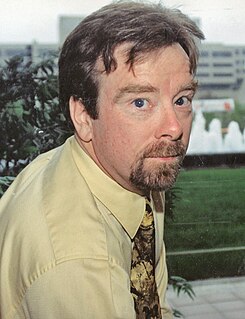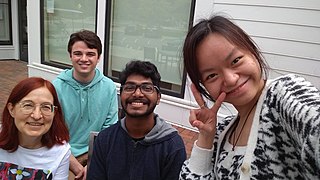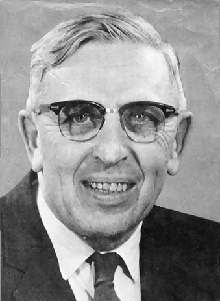
The Forge of God is a 1987 science fiction novel by American writer Greg Bear. Earth faces destruction when an inscrutable and overwhelming alien form of life attacks.

James White was a Northern Irish author of science fiction novellas, short stories and novels. He was born in Belfast and returned there after spending some early years in Canada. After a few years working in the clothing industry, he worked at Short Brothers Ltd., an aircraft company based in Belfast, from 1965 until taking early retirement in 1984 as a result of diabetes. White married Margaret Sarah Martin, another science fiction fan, in 1955 and the couple had three children. He died of a stroke.

Ender's Game is a 1985 military science fiction novel by American author Orson Scott Card. Set at an unspecified date in Earth's future, the novel presents an imperiled humankind after two conflicts with an insectoid alien species they dub "the buggers". In preparation for an anticipated third invasion, Earth's international military force recruits young children, including the novel's protagonist, Andrew "Ender" Wiggin, to be trained as elite officers. The children learn military strategy and leadership by playing increasingly difficult war games, including some in zero gravity, where Ender's tactical genius is revealed.

Carolyn Janice Cherry, better known by the pen name C. J. Cherryh, is an American writer of speculative fiction. She has written more than 80 books since the mid-1970s, including the Hugo Award-winning novels Downbelow Station (1981) and Cyteen (1988), both set in her Alliance–Union universe, and her Foreigner series. She is known for worldbuilding, depicting fictional realms with great realism supported by vast research in history, language, psychology, and archeology.

Gardner Raymond Dozois was an American science fiction author and editor. He was the founding editor of The Year's Best Science Fiction anthologies (1984–2018) and was editor of Asimov's Science Fiction magazine (1986–2004), garnering multiple Hugo and Locus Awards for those works almost every year. He also won the Nebula Award for Best Short Story twice. He was inducted to the Science Fiction Hall of Fame on June 25, 2011.

Robert Silverberg is an American author and editor, best known for writing science fiction. He is a multiple winner of both Hugo and Nebula Awards, a member of the Science Fiction and Fantasy Hall of Fame, and a Grand Master of SF. He has attended every Hugo Awards ceremony since the inaugural event in 1953.

John Joseph Vincent Kessel is an American author of science fiction and fantasy. He is a prolific short story writer, and the author of four solo novels, Good News From Outer Space (1989), Corrupting Dr. Nice (1997), The Moon and the Other (2017), and Pride and Prometheus (2018), and one novel, Freedom Beach (1985) in collaboration with his friend James Patrick Kelly. Kessel is married to author Therese Anne Fowler.

The Fall of Hyperion is the second novel in the Hyperion Cantos, a science fiction series by American author Dan Simmons. The novel, written in 1990, won both the 1991 British Science Fiction and Locus Awards. It was also nominated for the Hugo Award and the Nebula Award.

Ian McDonald is a British science fiction novelist, living in Belfast. His themes include nanotechnology, postcyberpunk settings, and the impact of rapid social and technological change on non-Western societies.

John Michael Scalzi II is an American science fiction author and former president of the Science Fiction and Fantasy Writers of America. He is best known for his Old Man's War series, three novels of which have been nominated for the Hugo Award, and for his blog Whatever, where he has written on a number of topics since 1998. He won the Hugo Award for Best Fan Writer in 2008 based predominantly on that blog, which he has also used for several charity drives. His novel Redshirts won the 2013 Hugo Award for Best Novel. He has written non-fiction books and columns on diverse topics such as finance, video games, films, astronomy, writing and politics, and served as a creative consultant for the TV series Stargate Universe.

James Patrick Kelly is an American science fiction author who has won both the Hugo Award and the Nebula Award.

Joan Lyn Slonczewski is an American microbiologist at Kenyon College and a science fiction writer who explores biology and space travel. Their books have twice earned the John W. Campbell Memorial Award for Best Science Fiction Novel: A Door into Ocean (1987) and The Highest Frontier (2011). With John W. Foster and Erik Zinser, they coauthor the textbook, Microbiology: An Evolving Science now in its fifth edition. They explore ideas of biology, politics, and artificial intelligence at their blog Ultraphyte.
Saturnalia was a 1986 science fiction novel by Grant Callin, published by Baen Books. It was based on a short story named "Saturn Alia". It was followed by a sequel, A Lion on Tharthee.

The Nebula Awards #18 is an anthology of science fiction short works edited by American writer Robert Silverberg. It was first published in hardcover by Arbor House in October 1983; a paperback edition with cover art by Gary LoSasso was issued by Bantam Books in September 1984.

Space opera is a subgenre of science fiction that emphasizes science fictional space warfare, with use of melodramatic, risk-taking space adventures, relationships, and chivalric romance. Set mainly or entirely in outer space, it features technological and social advancements in faster-than-light travel, futuristic weapons, and sophisticated technology, on a backdrop of galactic empires and interstellar wars with fictional aliens, often in fictional galaxies. The term has no relation to opera music, but is instead a play on the terms "soap opera", a melodramatic television series, and "horse opera", which was coined during the 1930s to indicate a clichéd and formulaic Western film. Space operas emerged in the 1930s and continue to be produced in literature, film, comics, television, video games and board games.

Clifford Donald Simak was an American science fiction writer. He won three Hugo Awards and one Nebula Award. The Science Fiction Writers of America made him its third SFWA Grand Master, and the Horror Writers Association made him one of three inaugural winners of the Bram Stoker Award for Lifetime Achievement.
The Expanse is a series of science fiction novels by James S. A. Corey, the joint pen name of authors Daniel Abraham and Ty Franck. The first novel, Leviathan Wakes, was nominated for the Hugo Award for Best Novel in 2012. The complete series was nominated for the Hugo Award for Best Series in 2017. It later won, following its second nomination for the same award in 2020.

Nebula Awards Showcase 2002 is an anthology of award-winning science fiction short works edited by Kim Stanley Robinson. It was first published in trade paperback by Roc/New American Library in April 2002.
Dale Frederick Bailey is an American author of speculative fiction, including science fiction, fantasy and horror, active in the field since 1993. He writes as Dale Bailey.

The Final Architecture is a series of science fiction novels by Adrian Tchaikovsky. As of 2022, it comprises Shards of Earth and Eyes of the Void, with a final volume entitled Lords of Uncreation expected to be published in 2023. The series focuses on a group of humans fighting against the mysterious Architects, who destroy inhabited planets. The series has been well-received critically, with Shards of Earth winning the 2021 BSFA Award for Best Novel.

















